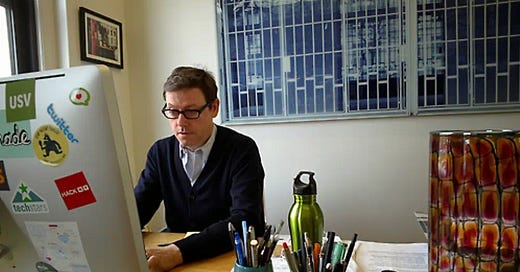"Learning from Failure" - Lessons By Fred Wilson
I was at a small conference in New York City in October 2022 where legendary investor Fred Wilson (Union Square Ventures) spoke about the shutdown of Flatiron Partners in 2001 — his fund that preceded Union Square Ventures.
The audience was full of emerging fund managers, and I was struck by how candid and transparent Fred was about his own failures at Flatiron Partners.
I hadn't heard the Flatiron Partners story, as most investors in emerging manager circles focus on Union Square Ventures' success.
On my flight home, I discovered a 2017 MIT Sloan School of Management article titled "What Fred Wilson Learned From Flatiron Partners’ Failure" that detailed the story I'd heard.
“We made a fortune and we lost it in the blink of an eye,” Wilson said about his dot-com era venture capital firm, Flatiron Partners, which he founded in 1996. “We shut down Flatiron in early 2001 and I spent the next two years licking my wounds and internalizing the lessons of Flatiron.”
Fred's subsequent firm, Union Square Ventures (early backers of Twitter, Tumblr, Etsy, Coinbase), is a top-tier venture fund. At Chapter One, we highly value their thesis-driven approach.
Reflecting on 2023, Silicon Valley's "year of many failures," I figured Fred's lessons from Flatiron Partners could offer timely insights for investors and founders.
I’ve included my own thoughts for investors and founders in italics after the lessons.
Making Mistakes Is Good For You: After the shutdown of Flatiron Partners, Wilson said, "Failure is favorable if you take the time to learn from it. I am who I am because of the [failure of] Flatiron”.
Setbacks often pave the way for bigger triumphs. Union Square Ventures is living proof. Despite facing hundreds of fundraising rejections, Union Square Ventures eventually raised $125 million and went on to be instrumental in the success of startups like Twitter, Tumblr, and Etsy.
Investors: 2023 is tough for many venture funds. Like Fred in 2001, learn from setbacks. A VC career will have its peaks and valleys—that's the game.
Founders: Leading a business is hectic. Despite the constant fires and emails, prioritize reflection and adjust your course when needed.
Role of a Venture Capitalist - Cheerleader: Contrary to popular belief, Wilson believes that a VC's primary customers are the entrepreneurs, not the investors. This view emphasizes the people-centric nature of the business. A venture capitalist's role isn't just about understanding finance, markets, or technology. It’s about rallying behind entrepreneurs who are the real forces driving innovation.
In Fred's words, venture capitalism is ultimately about "learning how to work with people…who are charismatic, brilliant, frustrating, anxious, and fragile."
Investors: Support founders facing failure in 2023. Their journey is lonely, especially in hard times. While many investors shy away from struggling ventures, be the person founders want to call in their toughest moments.
Founders: Reach out to supportive investors during tough times. Top investors want to help, but you need to open up about your challenges. Transparent communication builds trust. They value these conversations more than you realize.
The Importance of Having Your Own Cheerleader: Behind Wilson's venture success lies the unwavering support of his wife, Joanne. She has been his anchor, helping him navigate the tumultuous waters of venture capitalism. For Wilson, Joanne's faith in him, combined with her expertise as an angel investor, has been instrumental. Her story underlines the significance of having a strong support system, both personally and professionally.
Investors: Find your support system and show them appreciation. Before my career took off, Simone, now my partner, was my rock. I often say she should be a life coach given her grounding influence.
Founders: Prioritize relationships—family, friends, and those who value your life outside work. Startups may fade, but strong relationships endure. Make time for these connections. I've overlooked this in the past and lost touch with many dear to me.
The best time to invest is when no one but you believes: “The corollary to that is you have to totally believe in it and you have to know why,” Wilson said.
Wilson acknowledged that it sometimes tricky knowing when you are wrong about something you believe in, but that ultimately, a bad company or product will fail “as long as you don’t prop it up.”
“We are fortunate, in some ways in the venture business, that bad ideas reveal themselves,” Wilson said.
Investors: Being an independent thinker is challenging, especially in technology markets that are cyclical and narrative driven. When other investors don’t recognize the same opportunity you do, there is less competition to execute on your thesis.
One of my favorite phrases is that to be a successful investor you have to be “short term wrong, to be long term right.” Staying true to a unique belief is challenging, but if you're right and pick winners, the payoff can be rewarding.
Founders: Your "earned secret" for launching a business stems from unique personal and professional insights that guide a disruptive idea. We believe the best founders are uniquely suited, a "1 of 1", to start their company. Always remember your distinct edge.
The lessons from 2023, Silicon Valley's "year of failures" go beyond just business strategies or financial models. They emphasize persistence, genuine business relationships, and unwavering self-belief.
Today, as tech rebounds, learning from past mistakes can prevent future risks and transform failure into a launchpad for success.




